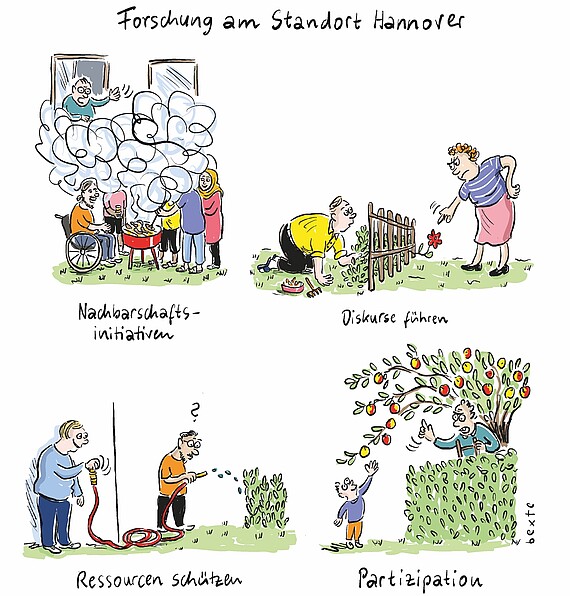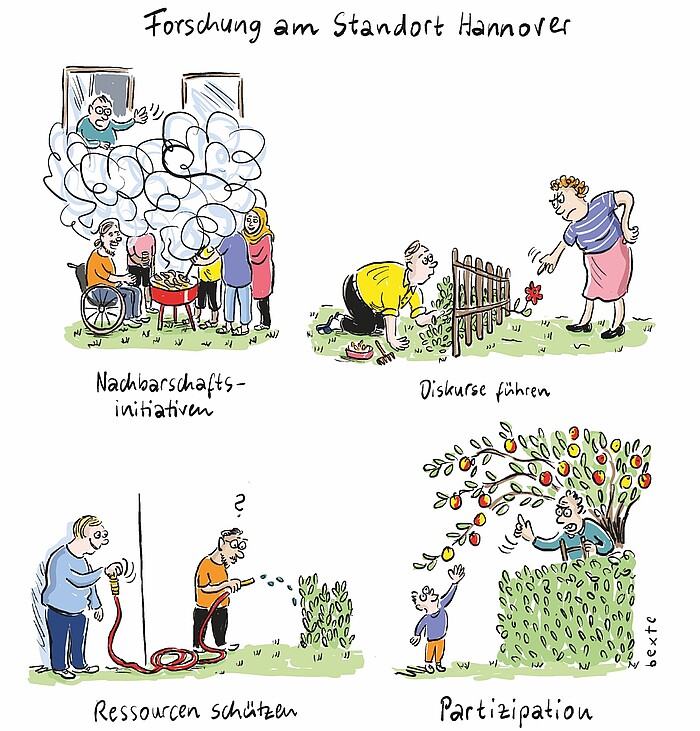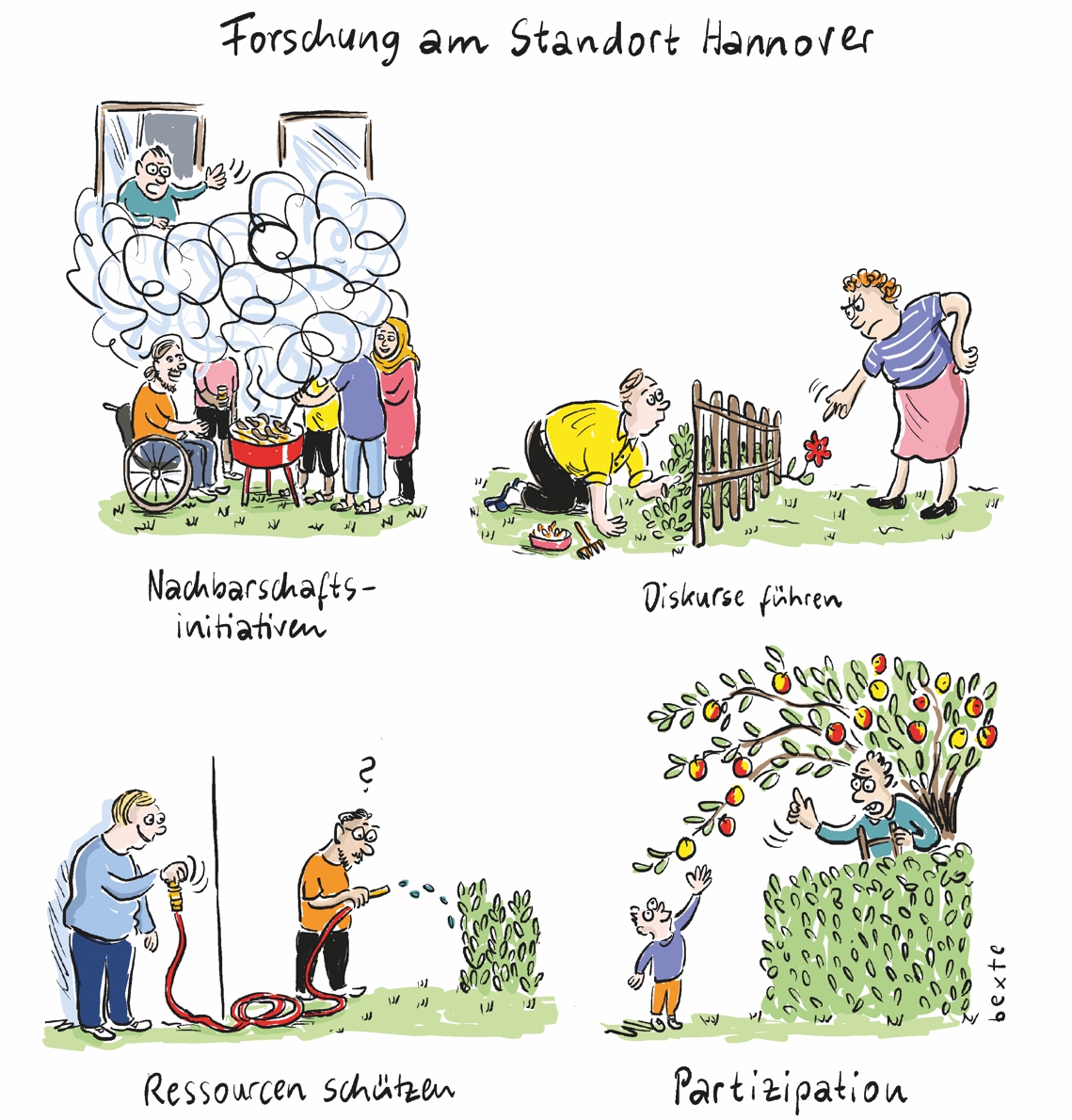Research Institute Social Cohesion (RISC) – Section Hannover - Stage 2

| Led by: | Prof. Dr. Peter Dirksmeier |
| Team: | Dr. Angelina Göb; Dr. Jessica Baier; Lukas Häfner |
| Year: | 2024 |
| Funding: | Federal Ministry of Education and Research (BMBF) |
| Duration: | 2024 – 2027; 2027 – 2029 |



The Research Institute Social Cohesion (RISC) has entered its second funding phase after a successful review. The RISC section at the Institute of Economic and Cultural Geography (IWKG) in Hannover will be funded by the Federal Ministry of Education and Research (BMBF) with a sum of around 1.65 million euros until 2027. In the event of a successful interim evaluation, funding will continue until 2029 and will then increase to a total funding volume of around 2.5 million euros.
Within the institute as a whole, the Hannover site is addressing the challenges of social cohesion from a spatial, regional perspective. The five projects are located, inter alia, in the Department of Cultural Geography and in Physical Geography (Institute for Earth System Sciences). The Hannover projects focus on social cohesion in a specific spatial context and on social-ecological transformation processes.
The following work packages are being addressed at the Institute of Economic and Cultural Geography:
- C_02: Social infrastructures within the neighbourhood nexus – on the perception and practice of social cohesion in urban areas
- C_08: Regional panel
Both projects analyse contacts and interactions between people in urban public spaces and the influence of encounters on attitudes. The aim of the project, which is being implemented in work packages C_02 and C_08, involves conducting international comparative research from a social-geographical and urban development perspective to explore social infrastructures as a starting point for social cohesion in neighbourhoods. How and where cohesion is practised and perceived and in what form will become evident through a mixed-methods approach that incorporates the results of the first funding phase (Han_F_01, Han_F_02) and expands the research desideratum of ‘social infrastructure’.
C_02 aims to identify how social infrastructures influence social cohesion in neighbourhoods and what impact divergent state or municipal guidelines for infrastructure provision and distribution have on local cohesion. On the basis of an international comparison of the city of Hannover with the city-state of Singapore, the project will examine how cohesion policy is pursued and implemented at different levels and how it is embedded socio-culturally in the perceptions and actions of various actors. Central to this analysis is the social production and perception of cohesion-building opportunity structures in the ‘immediate environment’ of neighbourhoods; a spatial scale that plays a decisive role in the perpetuation of social cohesion and makes it directly tangible and possible by providing social infrastructures.
C_08 represents a continuation of the quantitative regional panel (RP) of the first FGZ funding period, which measures regional variations in social cohesion and numerous social determinants in twelve research locations. The RP involves the RISC locations Bielefeld, Göttingen, Halle and Hannover. As a repeated cross-sectional survey, the RP enables causal analyses of changes in local cohesion in a regionally contextualised multi-level design. Local social cohesion is operationalised as a composite of identification, trust and collective efficacy. The spaces of creating, experiencing and enabling cohesion are conceived relationally. Therefore, the individual data of the regional panel are enriched with spatial context data. In addition to social-statistical characteristics (demography, migration, unemployment, etc.), current social and political developments with implications for social cohesion can also be taken into account.
About the FGZ
The Research Institute Social Cohesion (RISC) was established by the BMBF in 2020 as an interdisciplinary and decentralised institute. It combines the expertise of around 200 researchers at eleven locations in Germany. Its aim is to advance basic research on issues of social cohesion and to enrich public discourse through innovative knowledge transfer. In its first funding phase, the RISC has already built up a unique data infrastructure that can be used to draw important conclusions about social cohesion in Germany and Europe.
Contact details:
Dr. Jessica Baier
Project co-ordinator of the RISC Section Hannover
Research Institute Social Cohesion (RISC)
Institute of Economic and Cultural Geography
E-Mail: baier@kusogeo.uni-hannover.de
Lukas Häfner
Project co-ordinator of the RISC Section Hannover
Research Institute Social Cohesion (RISC)
Institute of Economic and Cultural Geography
E-Mail: haefner@kusogeo.uni-hannover.de
Dr. Angelina Göb
Principal Investigator (PI) of the projects C_02 & C_08
Research Institute Social Cohesion (RISC)
Institute of Economic and Cultural Geography
E-Mail: goeb@kusogeo.uni-hannover.de
Prof. Dr. Peter Dirksmeier
Spokesperson of the RISC Section Hannover
Research Institute Social Cohesion (RISC)
Institute of Economic and Cultural Geography
E-Mail: dirksmeier@kusogeo.uni-hannover.de
Publications
- Dirksmeier, P. (2025): Rezension zu: Pfister, Dieter: Habitus – Raum – Atmosphäre. Herleitung und Modellierung einer ganzheitlich-nachhaltigen und praxisorientierten Theorie der Mensch-Raum- Zeit-Beziehungen. 244 S. edition gesowip, Basel, 2024. Geographische Zeitschrift 113(1), 62-64.
- Knaps, F.; Baier, J.; Lazarevski, S. (2024): Citizens initiatives and citizen’s actions – citizen engagement for urban development. In: Othengrafen, F.; Herrmann, S.; Pencic, D.; Lazarevski, S. (Hrsg.): Social Cohesion and Resilience through Citizen Engagement: A Place-based Approach, Edward Elgar Publishers, 2-18. DOI: 10.4337/9781035317103.00010
- Baier, J.; Knaps, F.; Herrmann, S. (2024): Co-Producing urban neighborhoods: (Non-)Collaboration between Citizens Initiatives and Municipalities in Germany. In: Othengrafen, F.; Herrmann, S.; Pencic, D.; Lazarevski, S. (Hrsg.): Social Cohesion and Resilience through Citizen Engagement: A Place-based Approach, Edward Elgar Publishers, 124-139. DOI: 10.4337/9781035317103.00021
- Dirksmeier, P. (2024): The eroding power of anti-immigrant attitudes for social cohesion in Singapore: more myth than fact? GeoJournal 89, 236. DOI: 10.1007/s10708-024-11230-3
- Baier, J.; Knaps, F. (2024): Bürger*innen übernehmen Verantwortung vor Ort – qualitative Forschungsergebnisse zu lokalem Engagement aus deutschen Fallstudiengebieten. SWS-Rundschau Heft 2/ 2024, 140-159.
- Göb, A. (2024): Kohäsion durch Koexistenz? In: Altrock, U.; Bertram, H. u. A. Krüger (Hrsg.): Neue Suburbanität? Stadterweiterung in Zeiten der Reurbanisierung. Bielfeld: transcript Verlag, 255-274.
Presentations to Scientific Audiences
- Göb, A.: Nachbarschaften – Infrastrukturen des Zusammenhalt(en)s. Dortmunder Konferenz Raum‐ und Planungsforschung - DOKORP 2025: „Grund zum Planen in Zeiten multipler Krisen“ - Forschen und Planen für den Sustainability Turn. Track 6: Toleranz, Demokratie und Inklusion – Quartiersentwicklung gestalten. Dortmund, 11.02.2025.
- Göb, A.: Vollzug – eine raumzeitliche Aus- und Zurichtung. Jahrestagung der DGS Sektion Soziologie des Körpers und des Sports: "Körper – Zeit – Umwelten: Zur Materialisierung und Verkörperung neuer Temporalitäten". Hamburg. 05.12.2024.
- Göb, A.: Gesellschaftlicher Zusammenhalt vor Ort. Aktion Mensch - Kongress "Veränderungen gestalten. Kommunen werden inklusiv. Erfurt, 26.11.2024.
- Göb, A.: Mapping social cohesion via social infrastructure. RGS-IBG Annual International Conference – AC2024 Mapping. London. 28.08.2024.
- Göb, A.: Gesellschaftlicher Zusammenhalt in der / für die Demokratie. Nachbarschaften – (Kon-)Figurationen des Zusammenhalts. Niedersachsenweiter Fachtag Quartiersentwicklung und Gemeinwesenarbeit. „Wie stärken wir gemeinsam den gesellschaftlichen Zusammenhalt in unseren Stadtquartieren und Nachbarschaften?“ und Bewohner*innen-Initiativen-Treffen (BIT). Hameln, 06.06.2024.
Panel chair/host
- Göb, A.: Wie können wir im Raum & durch Planung sozialen Zusammenhalt fördern und verstetigen? (Workshop), Niedersachsenweiter Fachtag Quartiersentwicklung und Gemeinwesenarbeit. „Wie stärken wir gemeinsam den gesellschaftlichen Zusammenhalt in unseren Stadtquartieren und Nachbarschaften?“, Hameln, 06.06.2024.
Transfer Events
- Tag der Bibliotheken 2024 unter dem Motto „Rummelplatz für Entdeckungen“. Mit einem Input von Benjamin Grudzinski (Urban Design/Platzprojekt) und anschließender Diskussion mit Dr. Tom Becker (Direktor der Stadtbibliothek Hannover) unter Moderation von Dr. Angelina Göb (Leibniz Universität Hannover/FGZ) zum Thema „Zivilgesellschaftliche Dritte Orte“, Hannover, 24.10.2024
- Göb, A.: "Zur Lage des Umlands". Im Gespräch mit der Frankfurter Allgemeinen Zeitung (FAZ) zur Lebenswelt Suburbia in der Rubrik Leben in Stadt & Land (Nr. 169, S. 8), Frankfurt am Main, 23.07.2024.
- Diskussion zwischen Prof. Dr. Christian Stegbauer (Johann Wolfgang Goethe-Universität) und Dr. Angelina Göb (Forschungsinstitut Gesellschaftlicher Zusammenhalt, TI Hannover) im Rahmen der Reihe ExLibris: Superschwache Beziehungen unter Moderation von Lars Hennemann (Chefredakteur der Rhein-Zeitung) zur Frage, was unsere Gesellschaft kulturell zusammenhält, Schader-Stiftung, Darmstadt, 19.06.2024.
- Dirksmeier, P.: "Wie gute Nachbarschaft gelingt – Miteinander statt nebeneinander". Audiobeitrag beim SWR Kultur Das Wissen, 17. Juni 2024.


